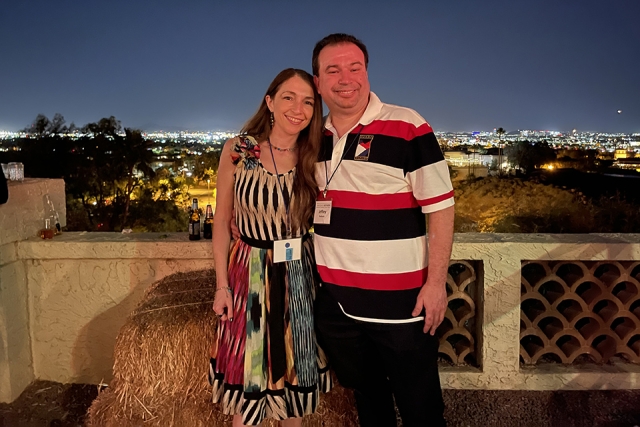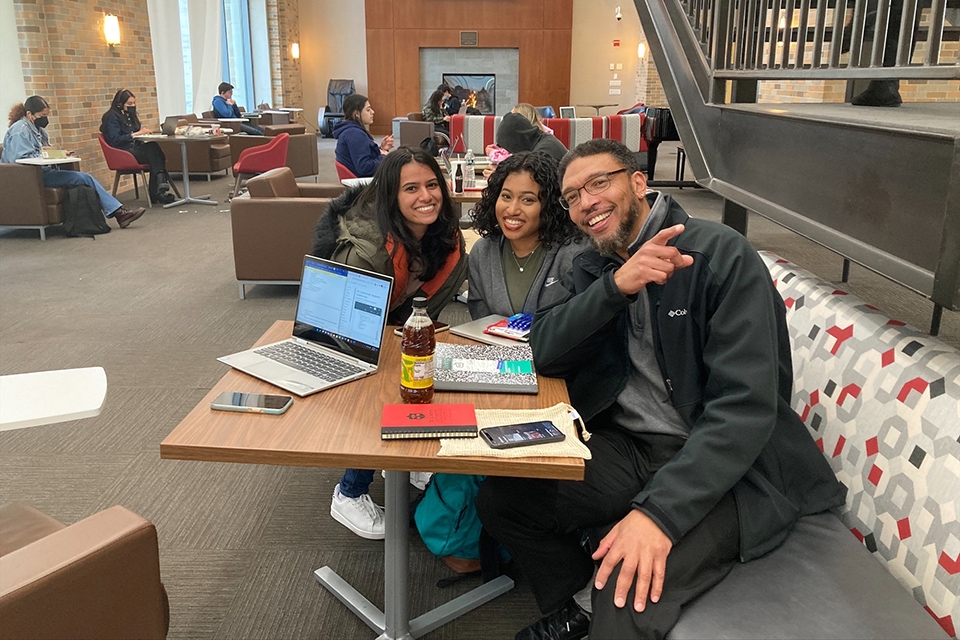
Dr. Sorochinski and Jeffrey Deskovic at a recent conference.
Jeffrey Deskovic has made it his life’s mission to overturn the cases of wrongfully convicted individuals and ease their transition to life outside prison, often after decades of incarceration. Much of the work he does through his foundation depends on the commitment of volunteers. He recently found an enthusiastic group of St. John’s University students in the Forensic Psychology class of Marina Sorochinski, Ph.D., Assistant Professor, Criminal Justice, Legal Studies, and Homeland Security, in The Lesley H. and William L. Collins College of Professional Studies.
Mr. Deskovic, an attorney and exoneree himself, met Dr. Sorochinski at John Jay College of Criminal Justice, where they collaborated for several events and panel discussions on wrongful convictions. “The topic of wrongful convictions is one about which I feel very strongly, and have a great deal of passion and interest,” Dr. Sorochinski stressed. Much of her academic research has been on the subject of improving investigative practices in serial violent crime, as well as understanding factors that lead to wrongful conviction within serial sexual assault.
After attending a workshop at St. John’s on Academic Service-Learning, a classroom/ experiential site-based program that involves students in some form of required community service, Dr. Sorochinski immediately thought of Mr. Deskovic’s foundation. “Jeffrey and I were discussing the issues exonerees face when they come out, and how little the system offers them,” she said.
More assistance is often available for those who actually committed the crimes for which they were incarcerated. “But the innocent need more support because the trauma is even more significant,” she explained.
Dr. Sorochinski believes teaching about wrongful convictions isn’t half as impactful as giving students the opportunity to interact with those who have suffered through the experience. “Hearing their stories and working with them closely is what has the greatest influence,” she said. “My hope is that this will have a lifelong impact on the students.”
The work of Dr. Sorochinski’s students in the AS-L project entitled, “Justice Served” is reminiscent of the story of St. Vincent de Paul, who was once falsely accused of the crime of theft—one for which the true culprit was caught years later, and the service is deeply connected to the Vincentian Mission of St. John’s. All of her students are criminal justice majors. “I hope once they are set in their careers they will recall this experience and recognize the importance of doing their jobs the right way to make sure fewer of these stories actually happen,” she said. “Systemic change comes from the bottom up.”
The focus of the work, Dr. Sorochinski noted, is on assisting clients with technology skills. They help them use a smartphone and computer, set up an email account, and fill out forms online. Wayne, a formerly incarcerated person currently working with Mr. Deskovic on exoneration, said he did not know what texting was when he was released from prison in 2010.

Incarcerated for more than 20 years, Wayne has shared his story with students, and they in turn have helped him navigate a new world to which he was never exposed. Student Emily Murphy said that hearing Wayne’s story has been educational and eye-opening, and she hopes to be part of the systemic change of which Dr. Sorochinski aspires. She has found it gratifying to assist him with issues such as fixing his phone screen and setting up an email account.
“The hope is to make that impact on the students,” Dr. Sorochinski said, “so they realize that they can help these people with their struggles.” Another example of the assistance students have provided clients is calling customer service to clear up issues clients don’t feel confident enough to address, such as problems with car insurance.
Students help Carolyn, another client, learn how to use her laptop. They meet via Zoom since she does not have a car. “It’s really based on the individual needs of the clients,” Dr. Sorochinski stressed. Students will write reflection papers based on their service experiences, which Dr. Sorochinski hopes will further imbed this work into their consciousness.
Another important element of the class, Dr. Sorochinski said, is the discussion of issues that lead to wrongful convictions, such as misidentifications, false memories, coerced confessions, as well as police and judicial misconduct. “Police are often so focused on one suspect that everything gets tinted and they discard evidence that may exculpate a suspect,” she explained. “Tunnel vision and confirmation bias are things of which we need to be aware.”
Student Loriana Mejia, who also works with Wayne, has been helping him transfer photos to his computer—but more importantly, he has been teaching and inspiring her. “He earned his bachelor’s degree in sociology while in prison and has been giving us very useful advice,” she said. “We’ve developed a nice friendship.”
Student Angelina DeCoro stressed that this experience has inspired her to go to law school and advocate for those who have been underserved by the justice system. Her classmate Keara Rose Shea has been assisting clients online. “We helped our client with his car insurance, but he really loves talking to us about his experiences, sometimes for hours. I think it’s been really educational for both parties.”
Carolyn, a former teacher who spent more than two decades in prison, has enjoyed the experience of working with Dr. Sorochinski’s students. “The concept of Academic Service-Learning is wonderful. The students can ask questions of people like me with firsthand experience. I received a note from someone in the department thanking me for being kind of a co-educator. That meant so much to me.”
Related News
Former FTC Chair Engages with Students at St. John’s Henry George Lecture
The youngest-ever Chair of the Federal Trade Commission (FTC) brought her economic wisdom and public policy experience to St. John’s University on February 5, speaking to a gathering of students...
Q&A with Brenda Almendarez-De Bello ’06M.S.Ed., ’19Ed.D., LEAD Honoree
Brenda Almendarez-De Bello ’06M.S.Ed., ’19Ed.D., Principal of Tamarac Elementary School in the Sachem Central School District , will be among several alumni honored by The School of Education (SOE) at...
Archbishop Hicks Attends St. John’s University Men’s Basketball Game at Madison Square Garden
St. John’s University proudly welcomed the Most Reverend Archbishop Ronald A. Hicks to Madison Square Garden on Monday, February 9, 2026, as he attended the Red Storm Men’s Basketball game in a show of support for the University community, its student-athletes, and its Catholic and Vincentian mission.
